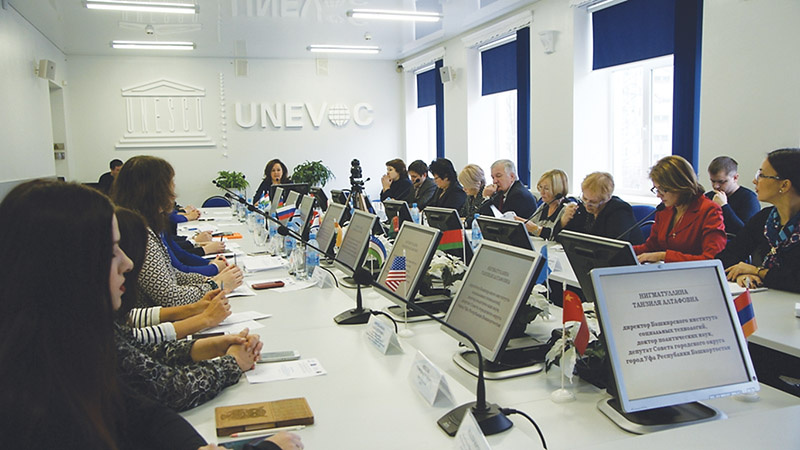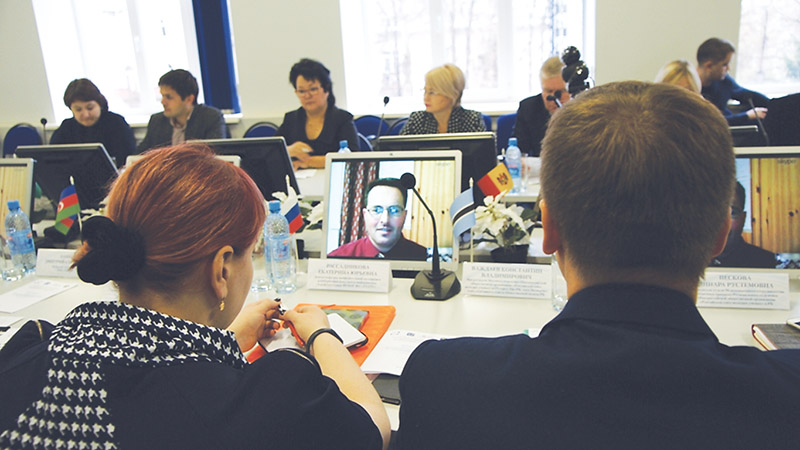
On the 26th October 2016 in the framework of the UNESCO and UNEVOC Centre in the Russian Federation housed by the Bashkir Institute of Social Technologies a round-table meeting «Experience of inter-agency cooperation in the field of professional training in the Republic of Bashkortostan» was held.
The round-table discussion was devoted to discussion of a number of issues in the following areas:
- Formation of readiness of children and youth to professional self-determination.
- Mechanisms of interaction between universities and employers.
- The European experience in guarantying of higher education quality. Best practices in the framework of TEMPUS project.
- Implementation of the strategy of development of the sphere of labor and employment of the population of the Republic of Bashkortostan.
- Management of the educational environment of the region. Interaction of authorities, non-governmental organizations, the business community and educational institutions.
The questions of higher education modernization, improving its quality, the connection with the «world of work» taking into account the challenges of the modern economy are relevant for Russia, and for the international community as a whole. More recently, the educational activities were dealt with only by educational institutions and specific power structures. But now the times are different. New challenges have demanded fundamental reforms in learning model and, consequently, new relationships. That’s why our round table brought together representatives of not only capital’s universities, but also the authorities, civil society organizations and employers. This is a chain, without which it is impossible to ensure the quality of training of future specialists today. There are a lot of problems in this area — and this is no secret — there is more than enough. The quality of graduates does not always satisfy employers, and hence the low competitiveness of young professionals in the labor market and, as a consequence, youth unemployment. Each university is seeking their own technologies to improve the education quality; the power structures are developing programs and strategies; employers also contribute in the form of the internships and job placement of graduates. This is evidenced by official statistics on estimation of youth unemployment level, which were given by the moderator of the meeting, the Head of the UNESCO and UNEVOC Centre in the Russian Federation housed by the Bashkir Institute of Social Technologies, Tanzilya Altafovnoy Nigmatullina. Opening the meeting, she stressed: «Today we are gathered to share our experience including the building of effective dialogue in the framework of social partnership».
The round table was attended by our colleague from Germany Jürgen Redler, the Chairman of the Society «Bridge of Friendship» Ufa-Bodensee, occupational therapist Kemphillskoy Leenhof village. He spoke about the problems of inter-agency cooperation in his country and how to solve them, he underlined that the experience of cooperation between Russia and Germany as part of the educational process is of particular importance: education technology, interdepartmental interaction technologies, issues of graduate employment — these things are developed jointly, taking into account the experience of the two countries.
The roundtable participants shared their experience in the field of career guidance and cooperation between higher education institutions of the republic and foreign partners and enterprises of the republic. The particular interest was caused by the report of a representative of the largest industrial enterprise in the republic — Ufa Engine Industrial Association which has a unique experience of inter-agency cooperation in the implementation of the system: the school — college — high school — the employer. The main problems are issues arising from the employment of young specialists, their unwillingness to carry out certain operations, social immaturity; and ways to solve these problems lay, first of all, in the close relationship between educational institutions and industrial enterprises.
The representatives of the State Assembly, Kurultai of the Republic of Bashkortostan, the delegates, the Ministry of Labor and Social Protection of the Republic of Bashkortostan took an active part in the discussion of all areas of work of the Round Table, responding to each identified problem and informing the participants about the measures taken by their institutions in the training of professional personnel in the republic.
Representatives of the Federation of Trade Unions of the Republic of Bashkortostan noted the role of non-governmental organizations in reducing youth unemployment, as well as their social adaptation.
At the completion, all the participants noted the relevance of the issues, formulated recommendations to promote more effective decision for above-mentioned problems, and expressed the wish to hold such discussions regularly.



 October 27th, 2016
October 27th, 2016  ALINA B.
ALINA B.  Posted in
Posted in